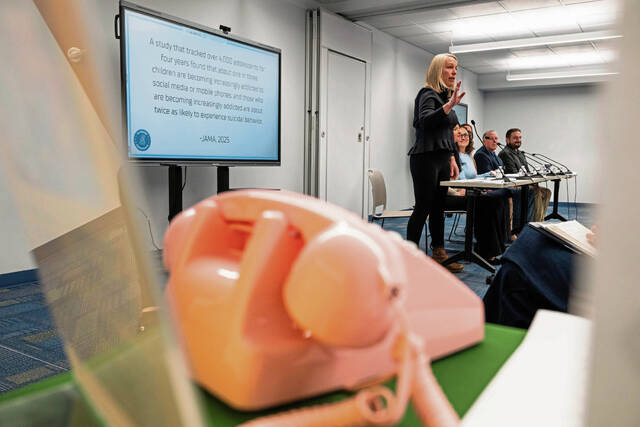A criminal case was dismissed against a Jeannette man charged with obstruction of justice based on allegations that he refused to identify himself to police last year.
Jonathan Durbiano, 42, was detained by Jeannette police in the early hours of June 6, 2021, on Maryland Street. He also was charged with possession of drug paraphernalia after officers found a marijuana vape pen in his pocket during a search while he was in custody.
Westmoreland County Common Pleas Judge Tim Krieger ruled state law did not support the police actions.
“A citizen of this commonwealth is free to refuse to talk with law enforcement and walk away. A legally unjustified detention does not change this. No criminal violation, therefore, can be found in the defendant’s act of failing or even outright refusing to provide identification,” the judge wrote.
Prosecutors claimed police had probable cause to stop and question Durbiano. During a court hearing in September, Assistant District Attorney Elizabeth Echard argued the stop occurred in a high-crime area and that officers were within their rights to question and search Durbiano as part of an ongoing investigation.
In a 16-page opinion last week, Krieger said there is no Pennsylvania law that requires a person to cooperate, identify themselves or answer questions from police when there is no probable cause to support their detention. The judge also ruled the police search of Durbiano was improper and barred prosecutors from using the evidence they found.
Bruce Antkowiak, a law professor at Saint Vincent College near Latrobe, said judges across the country and in Pennsylvania routinely have addressed a person’s constitutional right to remain silent and not cooperate with police.
“This is an issue that is well-traveled, but it is a matter of constant current concern. This comes up regularly,” Antkowiak said Tuesday.
Antkowiak said litigation over similar cases has focused on a concept of law called “a mere encounter,” in which investigators claim they have a right to question a person during an initial, cursory meeting and suspect a crime is being committed.
“There is no such thing as a mere encounter. A mere encounter is like a unicorn, but the courts absolutely believe police can come up to you and talk, but you should feel free to walk away. There are numerous mere encounter cases in the law, and oftentimes it is a major determining factor in many cases,” Antkowiak said.
Krieger said, if Jeannette officers’ interaction with Durbiano was a mere encounter, then no criminal violation occurred when he refused to provide his identity.
According to court records, police stopped Durbiano and another man after receiving an anonymous 911 call from a woman who said she saw men peeking into parked vehicles shortly after 1 a.m. Police claimed Durbiano matched the description of one of the suspects.
Police said the 911 caller later was questioned and admitted she didn’t see either man break into a vehicle. She told 911 she only saw men walking and looking around, which she found suspicious, and that prompted her to contact police, investigators wrote in a criminal complaint.
Durbiano’s defense attorney, Robert Domenick, argued there was no basis for police to detain and search his client and suggested the investigation was predicated on nothing more than suspicions raised by the caller.
“We thought we were right,” Domenick said of the defense’s argument. “We were right on the facts and right on the law. He didn’t do anything that caused the police to stop him on the street, and he didn’t have to answer any questions.”
Jeannette police Chief Donald J. Johnston Jr. and county District Attorney Nicole Ziccarelli did not respond to requests for comment.








